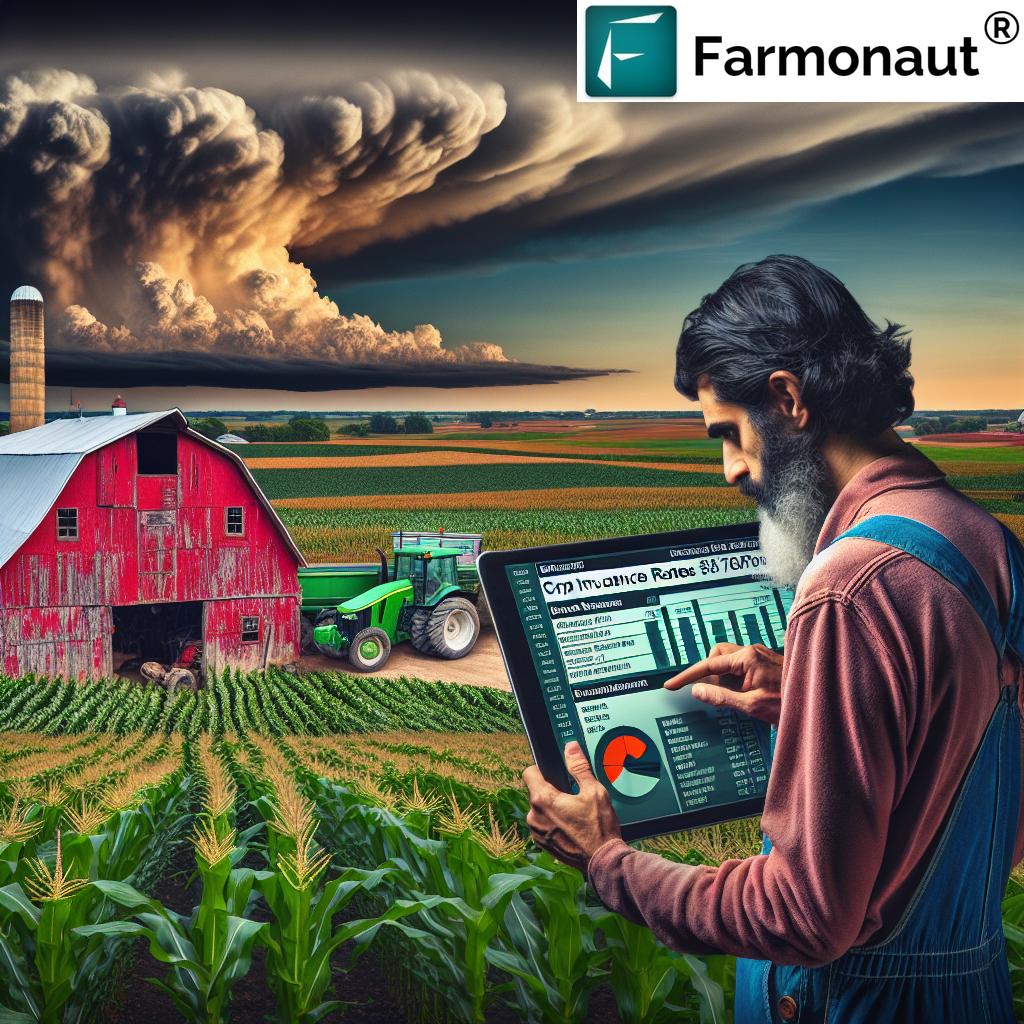Illinois Farm Bill Uncertainty: How Delayed Legislation Impacts Farmers, Crops, and Agricultural Policy
“Illinois ranks 3rd in U.S. agricultural exports, contributing significantly to the state’s economy despite current farm bill uncertainties.”
In the heartland of America, Illinois farmers are facing a period of unprecedented uncertainty. The delayed passage of the Farm Bill, a cornerstone of U.S. agricultural policy, has left many in the farming community anxious about the future. As we delve into this critical issue, we’ll explore how this legislative limbo is affecting Illinois’ agricultural landscape, from the sprawling cornfields of Paxton to the soybean-rich plains of Loda.
The Farm Bill Delay: A Closer Look
The Farm Bill, typically renewed every five years, is more than just a piece of legislation; it’s the lifeline of American agriculture. For Illinois farmers, the bill’s delay has far-reaching implications, touching every aspect of their operations. Let’s break down the key areas affected:
- Crop Insurance Programs: These programs are crucial for protecting farmers against unforeseen disasters and market fluctuations.
- Conservation Initiatives: Essential for maintaining soil health and environmental sustainability.
- SNAP Funding: While not directly related to farming, this program impacts the broader agricultural economy.
- Export Policies: Particularly important for Illinois, given its significant role in soybean and corn exports.
The uncertainty surrounding these programs has left many Illinois farmers in a precarious position, unsure of how to plan for the future.
Illinois Agriculture: A Pillar of the State’s Economy
To understand the gravity of the situation, we must first appreciate the importance of agriculture to Illinois. As the third-ranked state in agricultural exports, Illinois plays a crucial role in feeding not just America, but the world. In 2023, the state produced a staggering $10.8 billion in corn and $8.2 billion in soybeans, according to the USDA.
These figures underscore the vital role that Illinois farmers play in the national and global food supply chain. However, with the Farm Bill in limbo, this robust agricultural engine faces significant challenges.

The Human Face of Farm Bill Uncertainty
Behind these impressive statistics are the stories of individual farmers grappling with the realities of an uncertain future. Take Rick Nelson, a fourth-generation farmer from Paxton, Illinois. At 72, Nelson has seen his fair share of challenges in agriculture, but the current situation is unique.
“When we do any kind of planning, we have to be looking out one, two, three, even five years ahead in terms of purchases or cash flow needs,” Nelson explains. The lack of a clear legislative framework makes this long-term planning increasingly difficult.
Similarly, Jim Niewold, a 69-year-old corn and soybean farmer from Loda, expresses frustration with the delay. “They call it the Farm Bill, but it’s really much bigger than that ’cause it’s really like for food security for the country,” Niewold points out, highlighting the far-reaching implications of the legislation.
The Ripple Effects of Legislative Uncertainty
The delay in passing a new Farm Bill doesn’t just affect farmers; it has a cascading effect on various aspects of the agricultural sector and beyond:
- Crop Insurance: Without clear guidelines on crop insurance programs, farmers are left vulnerable to market volatility and natural disasters.
- Conservation Programs: Uncertainty in funding for conservation initiatives could lead to long-term environmental consequences.
- SNAP Funding: Changes in SNAP funding could impact not just recipients but also the broader food economy.
- Trade Relations: The lack of clear agricultural policy could affect international trade negotiations, particularly crucial for Illinois’ soybean exports.
“The delayed Farm Bill impacts three key areas: crop insurance, conservation programs, and SNAP funding for Illinois farmers.”
The Technology Factor: How Modern Solutions Can Help
In these uncertain times, technology can play a crucial role in helping farmers navigate challenges. Platforms like Farmonaut offer innovative solutions that can assist farmers in making data-driven decisions, even in the face of policy uncertainty.
Farmonaut’s satellite-based crop health monitoring and AI-driven advisory systems can provide valuable insights, helping farmers optimize their operations regardless of the legislative landscape. By leveraging such technologies, Illinois farmers can enhance their resilience and adaptability.
The Impact on Farm Equipment and Operational Costs
The uncertainty surrounding the Farm Bill also affects farmers’ decisions regarding equipment purchases and operational investments. Rick Nelson, for instance, is contemplating upgrading an aging tractor to a newer $334,000 model. However, without clear guidelines on potential subsidies or tax incentives that might be included in a new Farm Bill, making such a significant investment becomes a risky proposition.
This hesitation in equipment upgrades could have broader implications for the agricultural machinery industry, potentially leading to a slowdown in sales and innovation. It’s a clear example of how policy uncertainty can ripple through various sectors of the economy.
Trade Tensions and Export Concerns
Illinois, being a major player in agricultural exports, is particularly sensitive to changes in trade policies. The potential for retaliatory tariffs, similar to those imposed by China in 2018, looms large over the state’s soybean farmers. Any disruption in export markets could have severe consequences for Illinois agriculture.
Ryan Whitehouse, the Illinois Farm Bureau’s director of national legislation, emphasizes the need for modernized bills to address these concerns. “Farmers are working in the 2024 economy with a piece of legislation that was passed in 2018,” he notes, highlighting the disconnect between current economic realities and outdated policies.
The Role of State Government in Mitigating Uncertainty
While the Farm Bill is a federal issue, state-level responses can play a crucial role in supporting Illinois farmers during this period of uncertainty. State Representative Sonya Harper, who chairs the House Agriculture and Conservation Committee, expresses frustration at the federal delays, calling them “disrespectful to farm families.”
State-level initiatives could potentially include:
- Temporary state-funded support programs
- Enhanced agricultural education and training initiatives
- State-backed low-interest loans for farm equipment and operations
- Increased funding for agricultural research at state universities
These measures, while not a substitute for federal policy, could provide some stability and support for Illinois farmers as they navigate these uncertain times.
Long-Term Implications for Illinois Agriculture
The prolonged uncertainty surrounding the Farm Bill could have lasting effects on Illinois agriculture:
- Shift in Crop Choices: Farmers might opt for crops with lower input costs and more stable market prices.
- Consolidation of Farms: Smaller family farms may struggle to survive, leading to increased consolidation in the agricultural sector.
- Technological Adoption: The need for efficiency might accelerate the adoption of precision agriculture technologies.
- Diversification: Farmers might explore diversification into non-traditional crops or value-added products to spread risk.
These changes could reshape the landscape of Illinois agriculture in the coming years, potentially altering the state’s agricultural output and rural communities.
The Future of Illinois Farming: Adapting to Uncertainty
As we look to the future, it’s clear that Illinois farmers will need to adapt to an increasingly uncertain environment. This adaptation may involve:
- Embracing new technologies for more efficient farm management
- Diversifying income streams beyond traditional crop production
- Forming stronger cooperatives to increase bargaining power and share resources
- Engaging more actively in policy advocacy at both state and federal levels
By taking proactive steps, Illinois farmers can build resilience against policy uncertainties and market fluctuations.

The Role of Technology in Navigating Uncertainty
In these challenging times, technology can be a powerful ally for Illinois farmers. Advanced agricultural technologies, such as those offered by Farmonaut, can provide crucial insights and efficiencies:
- Satellite-Based Crop Monitoring: Real-time data on crop health can help farmers make informed decisions, even in uncertain policy environments.
- AI-Driven Advisory Systems: Personalized recommendations can optimize resource use and improve yields.
- Blockchain-Based Traceability: Enhancing supply chain transparency can open up new market opportunities.
- Resource Management Tools: Efficient management of resources can help farmers navigate financial uncertainties.
By leveraging these technologies, Illinois farmers can enhance their resilience and adaptability in the face of policy uncertainties.
Explore Farmonaut’s API for advanced agricultural insights
Access Farmonaut’s API Developer Docs
The Broader Impact on Rural Communities
The uncertainty surrounding the Farm Bill doesn’t just affect individual farmers; it has broader implications for rural communities across Illinois. These communities, often built around agriculture, face challenges such as:
- Potential population decline as younger generations leave farming
- Reduced local economic activity due to decreased farm spending
- Strain on local services and infrastructure as tax bases shrink
- Increased pressure on rural healthcare and education systems
Addressing these challenges will require a coordinated effort from state and local governments, as well as innovative solutions from the private sector.
The Consumer Perspective: Food Prices and Availability
While much of our discussion has focused on farmers, it’s important to consider the potential impact on consumers. The uncertainty in agricultural policy could lead to:
- Fluctuations in food prices, particularly for staple crops like corn and soybeans
- Changes in the availability of certain food products
- Shifts in dietary patterns as consumers adapt to changing food landscapes
- Increased interest in local and sustainable food sources
These changes could reshape consumer behavior and food markets in Illinois and beyond.
Environmental Considerations in Policy Uncertainty
The delay in passing a new Farm Bill also has environmental implications. Many conservation programs that incentivize sustainable farming practices are tied to Farm Bill funding. The uncertainty surrounding these programs could lead to:
- Reduced adoption of soil conservation techniques
- Delays in implementing water quality improvement measures
- Hesitation in transitioning to more sustainable farming methods
- Potential long-term impacts on Illinois’ natural resources
Balancing agricultural productivity with environmental stewardship remains a critical challenge, one that requires clear policy direction.
The Role of Agricultural Education and Research
In times of uncertainty, the importance of agricultural education and research becomes even more pronounced. Illinois’ renowned agricultural institutions, such as the University of Illinois, play a crucial role in:
- Developing new crop varieties resilient to changing climate conditions
- Researching innovative farming techniques to improve efficiency
- Training the next generation of farmers in advanced agricultural practices
- Providing extension services to support current farmers in adapting to challenges
Continued investment in these areas can help Illinois agriculture remain competitive and sustainable, even in the face of policy uncertainties.
The Global Context: Illinois Agriculture in the World Market
Illinois’ agricultural sector doesn’t exist in isolation; it’s part of a global food system. The uncertainty surrounding U.S. agricultural policy has implications for:
- International trade relationships, particularly with major soybean importers like China
- Global food security, given Illinois’ significant contribution to world grain supplies
- International competitiveness of U.S. agricultural products
- The role of U.S. agriculture in addressing global challenges like climate change
Understanding these global connections is crucial for Illinois farmers as they navigate an uncertain policy landscape.
The Path Forward: Advocating for Illinois Agriculture
As we consider the challenges facing Illinois agriculture, it’s clear that proactive advocacy is essential. Farmers, industry organizations, and policymakers must work together to:
- Push for timely passage of a comprehensive Farm Bill that addresses current realities
- Advocate for policies that support both large-scale operations and family farms
- Promote investment in agricultural research and technology
- Ensure that Illinois’ agricultural interests are represented in national and international forums
By raising awareness and engaging in constructive dialogue, stakeholders can help shape a more certain future for Illinois agriculture.
Embracing Innovation in Uncertain Times
While policy uncertainty presents challenges, it also creates opportunities for innovation. Illinois farmers have a long history of adapting to changing circumstances, and this situation is no different. Some areas of innovation include:
- Precision agriculture techniques to maximize efficiency
- Alternative crop varieties suited to changing climate conditions
- New marketing strategies to reach consumers directly
- Collaborative farming models to share resources and reduce risks
By embracing these innovations, Illinois farmers can position themselves for success, regardless of policy outcomes.
Illinois Agricultural Impact Summary
| Impact Area | Current Status | Potential Consequences | Significance for Illinois Farmers |
|---|---|---|---|
| Crop Insurance Programs | Uncertain funding levels | Increased financial risk for farmers | Critical for protecting against crop losses and market fluctuations |
| Conservation Initiatives | Potential funding cuts | Reduced adoption of sustainable practices | Important for long-term soil health and environmental stewardship |
| SNAP Funding | Under review | Potential impact on food demand and prices | Affects overall agricultural market dynamics |
| Soybean Exports | Vulnerable to trade tensions | Possible market loss and price drops | Major export crop for Illinois, crucial for farm income |
| Corn Production | Stable but facing challenges | Potential shifts in demand and pricing | Primary crop for many Illinois farmers, key to state’s agriculture |
| Farm Equipment Costs | Potentially increasing | Delayed upgrades, increased maintenance costs | Affects operational efficiency and long-term planning |
| Trade Tariffs | Ongoing uncertainty | Possible market disruptions | Can significantly impact export-dependent farmers |
| Family Farm Sustainability | Under pressure | Potential increase in farm consolidations | Threatens traditional farming structure and rural communities |
Conclusion: Navigating the Future of Illinois Agriculture
As we’ve explored throughout this article, the uncertainty surrounding the Farm Bill poses significant challenges for Illinois agriculture. From crop insurance to conservation programs, from trade policies to technological adoption, every aspect of farming in the state is affected by this legislative limbo.
However, the resilience and adaptability of Illinois farmers should not be underestimated. By leveraging advanced technologies, embracing innovation, and engaging in proactive advocacy, the agricultural community can navigate these uncertain times. The challenges ahead are significant, but so too are the opportunities for those willing to adapt and innovate.
As we look to the future, it’s clear that the success of Illinois agriculture will depend on a combination of smart policies, technological innovation, and the enduring spirit of its farming community. By working together and embracing change, Illinois can maintain its position as a leader in U.S. agriculture, ensuring a prosperous and sustainable future for generations to come.
FAQ Section
Q: How does the Farm Bill delay directly impact Illinois farmers?
A: The delay creates uncertainty in crucial areas such as crop insurance, conservation programs, and export policies, making it difficult for farmers to plan long-term investments and operations.
Q: What role does technology play in helping farmers during this uncertain period?
A: Advanced technologies like satellite-based crop monitoring and AI-driven advisory systems can provide valuable insights, helping farmers make data-driven decisions even in the absence of clear policy guidelines.
Q: How might the Farm Bill uncertainty affect food prices for consumers?
A: The uncertainty could lead to fluctuations in food prices, particularly for staple crops like corn and soybeans, as farmers adjust their production strategies in response to unclear policies.
Q: What can Illinois farmers do to adapt to the current situation?
A: Farmers can explore diversification strategies, invest in efficiency-enhancing technologies, form stronger cooperatives, and engage more actively in policy advocacy to build resilience against uncertainties.
Q: How does the Farm Bill delay impact rural communities in Illinois?
A: Rural communities may face challenges such as potential population decline, reduced local economic activity, and strain on local services and infrastructure due to the uncertainties in the agricultural sector.
Earn With Farmonaut: Affiliate Program
Earn 20% recurring commission with Farmonaut’s affiliate program by sharing your promo code and helping farmers save 10%. Onboard 10 Elite farmers monthly to earn a minimum of $148,000 annually—start now and grow your income!
















